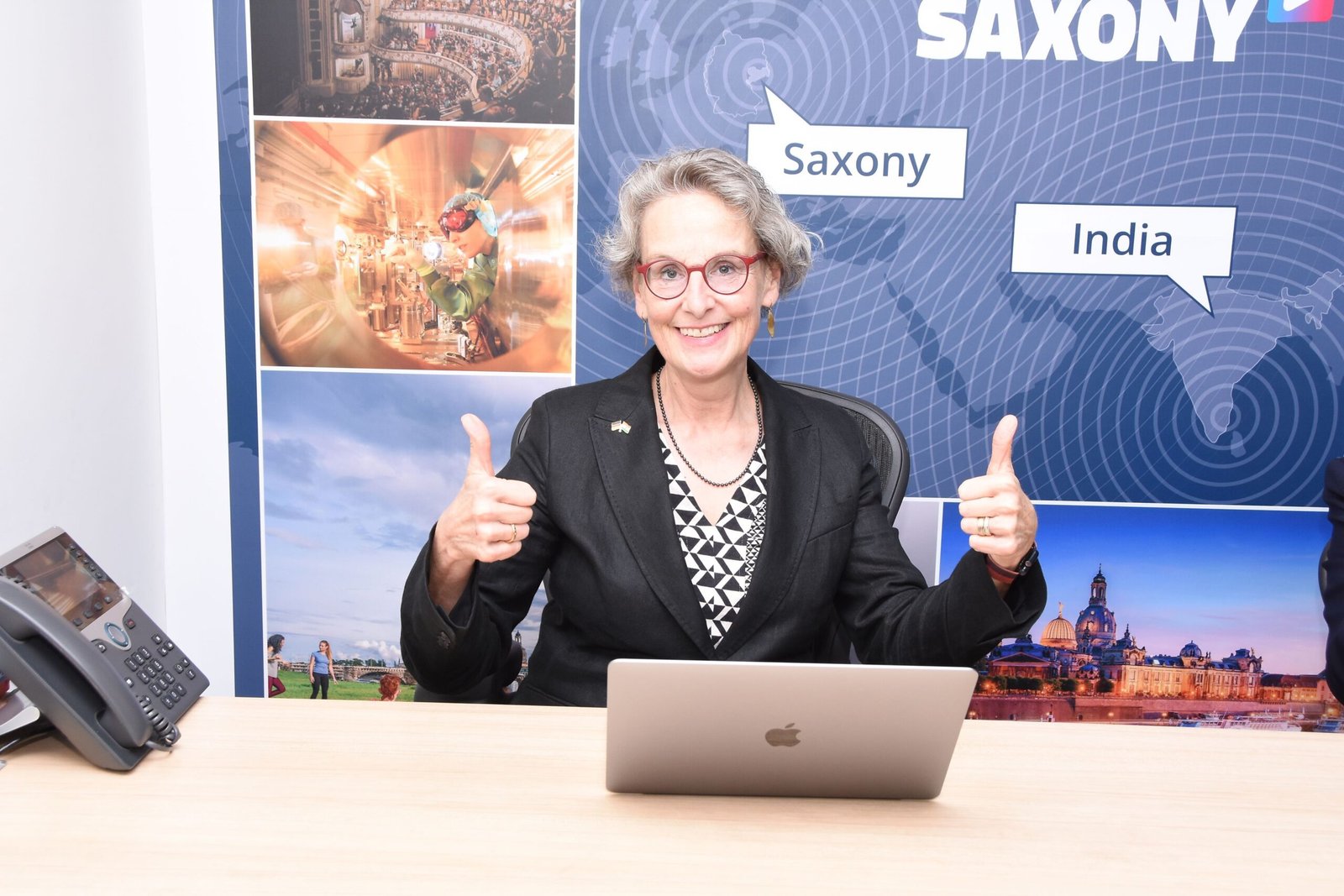Startup
It’s important to infuse academic education with entrepreneurial spirit: Rector of Dresden University of Technology

German university Technische Universität Dresden (Dresden University of Technology)—which has a special relationship with IIT Madras—is keen to intensify this alliance around three major areas: sustainability science, diabetes, and microelectronics and advanced material science in conjunction with AI applications.
Technische Universität Dresden (TUD) wishes to join forces with the premier Indian institute and venture capital (VC) funds in Tamil Nadu and the German state of Saxony to “infuse academic education with entrepreneurial spirit and ideas.”
“The future of entrepreneurship is global. We need to bring together the best VCs with the best entrepreneurs, wherever they are, and develop structures that facilitate that,” says Professor Ursula Staudinger, Rector of Technische Universität Dresden (TUD).
She believes global collaborations between academic institutions and other stakeholders in the ecosystem can help build these structures and bring great inventions and patterns quickly to fruition for the market.
In a connected world, collaboration is the way to complement each other rather than reinventing the wheel at different ends of the globe, she adds.
Commenting on the challenges of entrepreneurs globally, Prof Staudinger says the startup ecosystem needs a “scaffolding” so it gets more visible for private funders.
TUD hopes to provide this support along with IIT Madras and IIT Madras Research Park through workshops and curated pitches—“so that aspiring entrepreneurs can be refined towards founding a successful startup.”
“Eventually, we hope to join forces with different VC funds from Tamil Nadu and India, and with the ones in Germany, in Saxony,” says Prof Staudinger, who was in Chennai recently to open the Saxon Science Liaison Office India in the city on behalf of Saxon’s Ministry of Science and Saxon universities.
The Science Liaison Office aims to foster cooperation between scientists and entrepreneurs in India and Saxony. The office will also support student selection for study programmes in STEM subjects at Saxon universities. TUD is one of the state-run universities of excellence, in Saxony, located in the capital city of Dresden.
Prof Staudinger spoke to YourStory on the scope of TUD’s collaboration with IIT Madras and what the liaison office aims to achieve.
YourStory (YS): Could you take us through the Saxon Science Liaison Office India? What does it hope to achieve?
Prof Staudinger: TUD has opened the Saxon Science Liaison Office India in Chennai on behalf of the Ministry of Science, Saxony. We are basically conducting stewardship for 14 universities in Saxony. TUD is one of the users of this liaison office.
The office, which is doing service to all of Saxony, will focus on activities in Chennai and Tamil Nadu, which is a lot to cover already. Of course, there are natural links to Hyderabad and Bengaluru. For instance, some of the companies we are working with have a presence in these cities. So, the liaison office will also connect with other places in India if it’s relevant. But our focus is Tamil Nadu.
YS: TUD has a special relationship with the Indian Institute of Technology Madras. How is that shaping up?
Prof Staudinger: TUD has been engaged for more than two years with IIT Madras and IIT Madras Research Park. These conversations have been taking more concrete steps, and we are now ready to intensify our cooperation.
With IIT Madras, we are keen to intensify our activities around three big areas.
The first area is sustainability science. We are interested in basic research and how we can join forces and bring great inventions and patterns very quickly to fruition for the market.
The second area is health—all the research around diabetes and the underlying metabolic processes. There will be entrepreneurship activity and joint academic education. We are working on a joint graduate programme and a PhD programme, which brings together PhDs from IIT Madras and TUD around that topic.
The third area is microelectronics and advanced material science in conjunction with AI applications.
It is the whole range—from basic research and great inventions to patenting and inspiring and exciting young researchers to become entrepreneurs. We have been developing this new level of cooperation with IIT Madras successfully.
YS: Why did you choose Chennai for the India office?
Prof Staudinger: TUD is one of the Ivy League universities in Germany; so it’s really important we partner with the best of the best, and IIT Madras is just that.
Also, when we did our research, we found that the high school system, colleges, and bachelor education in Tamil Nadu is exquisite. For us, as a research-intensive university, this is important. There is a great number of potential students who might enjoy studying with us, together with IIT Madras and TUD.
The economy of Tamil Nadu is strong and growing. We prefer this exclusive and intensive relationship with the state, with a presence in Chennai, rather than being in a densely populated pond like Delhi or Mumbai.

Professor Ursula Staudinger, Rector of Technische Universität Dresden at the opening of the Saxon Science Liaison Office India in Chennai recently
YS: How will the office support networking with entrepreneurs in Tamil Nadu?
Prof Staudinger: One of the tasks of the liaison office is to build a network, know the stakeholders and some of the interesting players, and then bring them together with our (TUD) connection with IIT Madras Research Park and IIT Madras.
Then we will develop workshop opportunities where we can propose calls. And young entrepreneurs can apply and come to Saxony, or our entrepreneurs can come to Chennai. This will be, in a way, a type of incubator activity. We will do exchanges to make it profitable for entrepreneurs in Tamil Nadu and Saxony.
YS: You also aim to facilitate collaborations between universities and research institutions in Saxony and Tamil Nadu. How will it benefit students and aspiring entrepreneurs of both states?
Prof Staudinger: To give an example of our best practice in Taiwan—Saxony has established a science liaison office in Taipei. One of our strategic company partners is Taiwan Semiconductor Manufacturing Co (TSMC). With them, we developed an exclusive internship programme for students. TSMC has opened its doors for our students in their educational fab, so they can have hands-on experience in the semiconductor world and study at the top university in Taiwan.
We hope to develop something similar here. We (TUD) hope, together with IIT Madras Research Park, we can create workshop opportunities for young and aspiring entrepreneurs who need a little bit of tutoring and scaffolding so that they can be refined towards founding a successful startup.
Eventually, we hope to join forces with different VC funds from Tamil Nadu and India and with the ones in Germany in Saxony, where we organise pitches and curate startup ideas beforehand. Then, we have a highly selective field of pitches to make it attractive to VC funds.
YS: TUD has entered into a trans-campus agreement with IIT Madras. What does this entail?
Prof Staudinger: Trans-campus is an important tool that TUD has developed in the past 10-12 years, which links strategic university partners with us. There are multiple elements to it—joint faculty, jointly used facilities in TUD and IIT Madras, joint PhD students, and joint degrees to be developed in microelectronics and chip design.
The agreement brings together existing human power and resources of the two universities to be used together cooperatively, so it becomes a vibrant real and virtual campus.
YS: Could you share some details on the soon-to-be-signed MoU with IIT Madras Research Park?
Prof Staudinger: The research park is the incubator joining forces with TUD|Excite—an excellence centre for innovation, technology transfer, and entrepreneurship—to do workshops and incubate great patents to become startup ideas. In the next step, we will contribute to the conference that IIT Madras Research Park is planning for January 2025 in energy and sustainability.
YS: How do you view the startup ecosystem in India and globally? What are the promising areas and opportunities for collaboration?
Prof Staudinger: The climate crisis is posing a huge challenge the world over. So, anything about CO2 reduction and resource conservation is on target, and any technology or idea that furthers this cause is a hot topic.
The other hot topic is the digitisation of AI—the applications of AI in health. Rural medical care, any type of digital approach, e-health, and long-distance surgery are all topics on target.
Then there is a join between AI and Co2 reduction. The new LLMs (large language models) are energy-intensive. The more sophisticated they get, the more energy-intensive they become. We are interested in green electronics—how can we build semiconductors and computer systems that require less energy, and how can we make a closed energy system so the heat produced is fuelled back into the system.
The issues of startups are the same the world over. It is hard to find high-risk funding in the early days. To bridge the Valley of Death is an issue everywhere. That’s where universities come in, and that’s where public money comes in. The ecosystem needs a scaffolding so it becomes more visible to private funders. We need to infuse all of our academic education much more with entrepreneurial spirit and ideas.
We also need to develop new and innovative models of win-win cooperation between bigger companies and their R&D departments and the excellent basic research happening in institutions like IIT Madras and TUD. Many of the deep tech inventions sometimes are not affordable for public institutions, but the companies have it (money).
The future of entrepreneurship is global. We need to bring together the best VCs with the best entrepreneurs, wherever they are, and develop structures that facilitate that.
IIT Madras and TUD have a strong network and partners across the world. We want to bring them together for the sake and profit of entrepreneurs.
Startup
Irdai proposes to amend regulatory sandbox norms

Regulator Irdai has proposed to amend the norms related to ‘regulatory sandbox’ by incorporating principle-based approach and further facilitating the adoption of innovative ideas and new concepts across the insurance value chain.
Regulatory sandbox usually refers to live testing of new products or services in a controlled/test regulatory environment for which regulators may or may not permit certain relaxations.
The Insurance Regulatory and Development Authority of India (Irdai) constituted an internal committee to review the Irdai (Regulatory Sandbox) Regulations.
Based on the recommendations of the committee, it has proposed amendments to the regulatory sandbox regulations and seeks comments from the public at large on the proposed amendments.
Issuing an exposure draft on regulatory sandbox regulations, Irdai said the amendment seeks adoption of principle based approach over rule based approach.
The changes to the norms are also aimed to facilitate the introduction of innovative ideas/new concepts across the insurance value chain, Irdai said.
Irdai has invited comments from the stakeholders on ‘Exposure draft – Irdai (Regulatory Sandbox) (Amendment) Regulations, 2024’ by November 25.
Startup
Prodigy Finance secures $310M financing from DFC

Prodigy Finance, a global higher education finance company, has secured financing of up to $310 million with a funding commitment from the US International Development Finance Corporation (DFC).
This latest financing, building on the previous partnership with DFC, prioritises social impact with a minimum financing threshold of 30% for women and 50% for individuals from low- and lower-middle-income countries, it said in a statement.
“Together, we are empowering a new generation of global leaders to unlock opportunities that shape a brighter future,” said Prodigy Finance Chief Financial Officer Neha Sethi.
The higher education finance company’s borderless lending model allows students to apply for loans based on their future earning potential rather than their current circumstances or credit history.
Since its founding in 2007, the international student lender has enabled over 43,000 postgraduate master’s students to attend top universities, disbursing over $2.3 billion in funding to students from more than 150 countries.
Sonal Kapoor, Global Chief Commercial Officer of Prodigy Finance, told YourStory that India is its core market and has the largest share of its funding.
According to the Prodigy Finance 2022 Impact Report, students reported that the company’s loan helped them to pursue their dream career (91%), achieve success in their personal life (83%), and at least double their salary (74%).
In September, Prodigy Finance launched a $30 million blended finance programme in collaboration with The Standard Bank of South Africa Limited and Allan & Gill Gray Philanthropies.
Startup
Swiggy IPO: Retail portion subscribed 84%, overall 35% shares allotted

Food delivery and quick commerce platform Swiggy’s Initial Public Offering (IPO) was subscribed only 35% on the second day of bidding as broader market indices slipped in red.
Sriharsha Majety-led Swiggy witnessed the quota reserved for employees being subscribed 1.15 times by the end of bidding on the second day. Retail investors subscribed to 84% of the shares.
According to data from the Bombay Stock Exchange (BSE), non-institutional investors purchased 14% of their allocated shares, and qualified institutional buyers’ (QIBs) part was booked at 28%.
As of the second day, Swiggy’s IPO received bids for 5.57 crore shares, amounting to 35% of the total issue size. The issue was subscribed 12% on day one.
Swiggy, which is set to list on Indian stock markets on November 13, initially aimed for a valuation of approximately $15 billion, but later updated its RHP to seek a valuation of around Rs 87,000 crore or about $11.3 billion at the upper price band.
“Swiggy’s decision to lower its valuation leaves some upside room for the investors, we still recommend an AVOID recommendation to this issue due to the “reported negative” cash flows and ongoing losses, alongside a slightly high valuation of 7.7x FY24 price-to-sales,” noted Aditya Birla Money in a research report dated Nov 4.
It raised nearly Rs 5,085 crore (about $605 million) from anchor investors, which included life insurance and mutual fund arms of HDFC, ICICI, and SBI. The anchor book, which witnessed participation from over 75 key domestic mutual funds, also saw bids from global mutual fund investors like Astrone Capital, Fidelity, and Blackrock.
Swiggy plans to raise close to Rs 11,700 crore in its IPO which will include fresh issue of 11.54 crore equity shares along with an offer for sale (OFS) of 17.51 crore equity share by existing stakeholders. It has set IPO price band at Rs 371- Rs 390.
-

 Startup Stories1 year ago
Startup Stories1 year agoWhy Millennials, GenZs Are Riding The Investment Tech Wave In India
-

 Startup Stories1 year ago
Startup Stories1 year agoStartups That Caught Our Eyes In September 2023
-

 Startup Stories1 year ago
Startup Stories1 year agoHow Raaho Is Using Tech To Transform India’s Fragmented Commercial Trucking
-

 Startup Stories12 months ago
Startup Stories12 months agoMeet The 10 Indian Startup Gems In The Indian Jewellery Industry’s Crown
-

 Crptocurrency8 months ago
Crptocurrency8 months agoLither is Making Crypto Safe, Fun, and Profitable for Everyone!
-

 Startup Stories1 year ago
Startup Stories1 year agoHow Volt Money Is Unlocking The Value Of Mutual Funds With Secured Lending
-

 Startup Stories1 year ago
Startup Stories1 year agoWhy Moscow-Based Kladana Considers Indian SME Sector As The Next Big Market For Cloud Computing
-

 E-commerce1 year ago
E-commerce1 year agoTop Online Couponing Trends To Watch Out For In 2016




